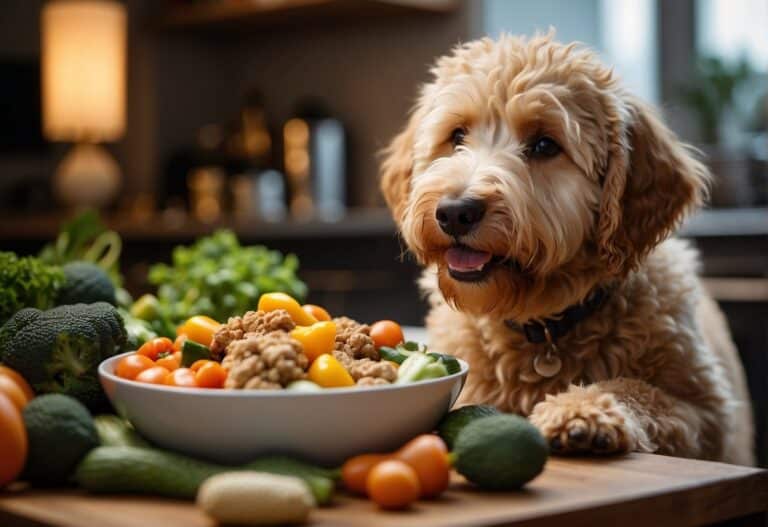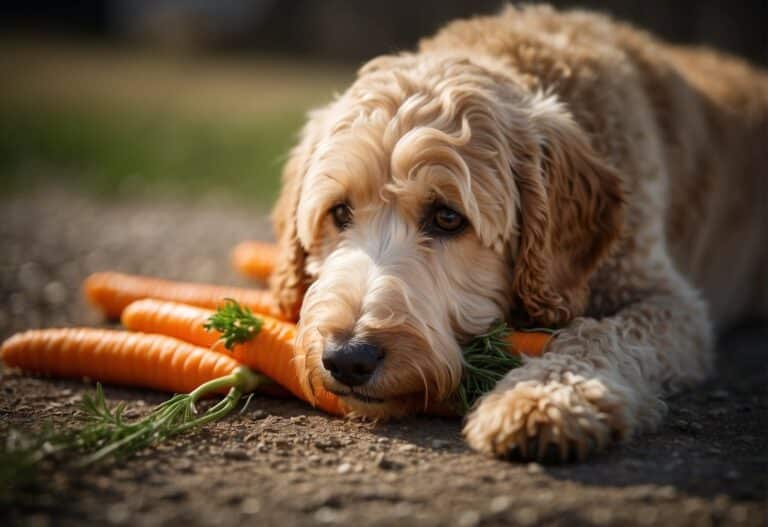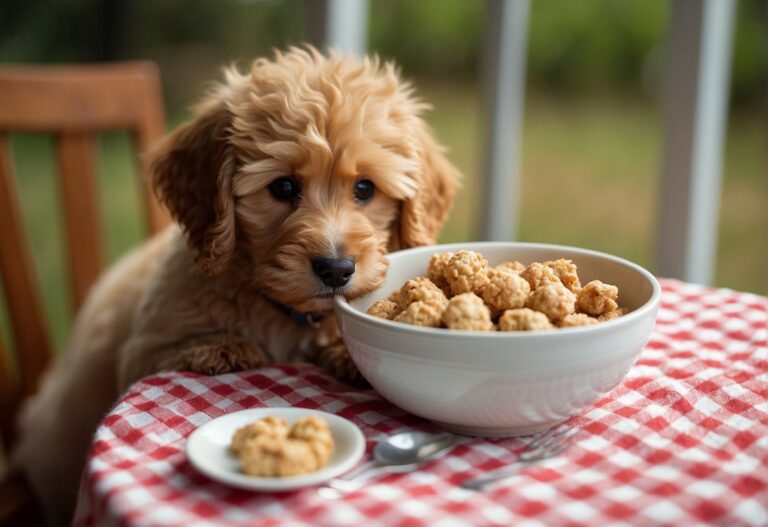How Much To Feed a Goldendoodle Puppy – Your Essential Diet & Nutrition Guide

Determining the right amount of food for your Goldendoodle puppy is crucial for their health and happiness. A well-balanced diet supports their rapid growth and development, ensuring they become strong, healthy adult dogs.
The iconic Goldendoodle comes in various sizes, which influences their dietary needs. As a mix between Golden Retrievers and Poodles, these puppies typically have a hearty appetite. They require a sufficient supply of nutrients to meet the demands of their energetic lifestyle.
Your Goldendoodle puppy’s diet should offer a strategic blend of proteins, fats, carbohydrates, vitamins, and minerals. While commercial puppy foods provide a convenient guideline, it’s important to understand that each puppy is unique and may have individual requirements.
Factors such as age, weight, activity level, and general health play significant roles in determining the exact feeding portions. Regular consultations with your veterinarian can help you tailor their feeding routine, ensuring your Goldendoodle gets the right nutrition for optimal growth.
- Proper nutrition is essential for your Goldendoodle puppy’s growth.
- Individual dietary needs vary based on several factors.
- A vet’s guidance is vital in determining the correct diet.
Nutrition Requirement of Goldendoodle Puppy
Proper nutrition is crucial for the healthy growth and development of your Goldendoodle puppy. Your puppy’s diet needs the right balance of proteins, carbohydrates, fats, vitamins, and minerals to ensure optimal health and energy levels.
Importance of Protein in Growth
Protein is the building block of your puppy’s muscular development. High-quality protein sources are essential for their growth, and typically, Goldendoodle puppies require diets that are about 22-24% protein.
Animal-based proteins such as chicken, lamb, or fish provide the amino acids necessary for tissue repair and muscle growth.
Carbohydrates and Energy Levels
Carbohydrates are important for providing your Goldendoodle with the energy it needs to be active and healthy.
They fuel the digestive system and should make up a significant portion of a puppy’s diet.
Complex carbohydrates like sweet potatoes and brown rice also contribute to stable blood sugar levels and sustained energy throughout the day.
Fats: The Good and the Necessary
Dietary fats should not be overlooked as they are vital for absorbing vitamins and providing concentrated energy.
A balanced diet for a Goldendoodle puppy should include an appropriate amount of fats, usually between 8-10%.
Fats also contribute to a healthy coat and skin, but remember, the quality of fat is as important as the quantity.
Vitamins and Minerals for Development
Lastly, vitamins and minerals are the fine-tuning elements of your Goldendoodle puppy’s diet. They play a key role in bone development, immune support, and metabolic regulation.
A balanced diet will usually provide all the necessary vitamins and minerals, but in some cases, supplements may be recommended by a vet to address any deficiencies.
Feeding Your Goldendoodle Puppy
When planning your Goldendoodle puppy’s diet, it’s essential to tailor the feeding routine and portion sizes to their age, size, and activity level.
Determining the Right Amount to Feed
To figure out how much to feed a Goldendoodle puppy, use a Goldendoodle puppy feeding chart as a reference.
Generally, the feeding amount is roughly one cup of food per 15 pounds of body weight each day, distributed over the day’s meals. Adjust portions according to your puppy’s individual needs and vet’s recommendations.
Frequency of Meals Through Different Stages
Your feeding schedule should evolve as your puppy grows.
Young puppies typically need to be fed more frequently:
- 8 weeks old: Feed your puppy four times a day.
- 3-6 months: Transition to three meals a day.
- After 6 months: Your puppy can start to have two meals a day.
Types of Food: Dry vs Wet
Select between dry food and wet food based on your puppy’s preference and dietary needs.
Dry food is beneficial for dental health and tends to be more nutrient-dense, while wet food can be more palatable and hydrating. Some owners opt for a mix to balance the benefits.
Transitioning From Puppy to Adult Food
Around the 12-month mark, you’ll begin transitioning your Goldendoodle to adult food.
To avoid stomach upset, gradually mix in the adult food with the puppy food over several weeks, increasing the adult food proportionately.
Special Dietary Considerations
When tailoring your Goldendoodle puppy’s diet, it’s essential to consider factors that can impact their health and well-being. Your pet’s dietary needs will change as they grow, and special attention is required to avoid obesity, account for food sensitivities, ensure joint health, and keep harmful foods out of their reach.
Preventing Obesity and Overfeeding
To prevent obesity and overeating, monitor your Goldendoodle’s calorie intake against their energy levels and growth needs.
Puppies require about 50-75 calories per pound of body weight daily, but this can vary based on individual activity.
Feeding schedules and portion control are crucial, aligning with the guideline of approximately one cup of food per 15 pounds of body weight per day.
Always measure food with a standard measuring cup and spread meals throughout the day to support a healthy metabolism.
Allergies and Sensitive Stomachs
Goldendoodles may experience allergies or have sensitive stomachs.
Signs include itching, digestive upset, or ear infections.
If you suspect your puppy has a food allergy, consult a veterinarian for guidance on an elimination diet to identify triggers.
Ingredients often linked to canine allergies include beef, dairy, and wheat. Offering a diet formulated for sensitive stomachs can also help alleviate symptoms.
Supplements for Joint Health
Supplements can play a role in promoting joint health, especially since breeds like Goldendoodles can be prone to conditions such as hip dysplasia.
Glucosamine and chondroitin supplements are beneficial for maintaining strong joints and cartilage.
Introduce any supplements gradually and only after consulting your vet to ensure they are necessary and suitable for your puppy’s specific health profile.
Avoiding Dangerous Foods
Several human foods are toxic to dogs. Ensure your puppy avoids chocolate, grapes, raisins, onion, and garlic, as these can cause severe health issues.
Even in small amounts, chocolate can lead to chocolate toxicity, while grapes and raisins have been associated with kidney failure in dogs. Onions and garlic can cause damage to red blood cells.
Keep these foods securely out of your puppy’s reach and educate your household on these dangers.
Monitoring and Adjusting Your Goldendoodle’s Diet
Properly monitoring and adjusting your Goldendoodle’s diet are crucial steps to ensure their overall well-being and health. It involves regular veterinary consultations, understanding their body condition, and considering their lifestyle and activity levels.
Regular Check-ups with Your Vet
Scheduling regular check-ups with your vet is essential to keep track of your Goldendoodle’s health and body weight.
During these visits, your vet can help assess whether your dog’s diet needs any adjustments.
For growing puppies, these check-ups can help determine if they’re receiving the proper amount of calories and nutrients for their age and size.
Understanding Body Condition
Being familiar with your Goldendoodle’s body condition can allow you to adjust feedings promptly to avoid weight-related health problems.
Two key indicators of good body condition are their ribs, which should be easily felt but not seen, and a waist that is observable from above and a tucked abdomen from the side.
Use a body condition scoring chart to regularly assess your dog’s physical shape.
Lifestyle and Exercise
The lifestyle and level of exercise your Goldendoodle gets have direct impacts on dietary needs.
An active dog will require more calories, while a more sedentary one may need fewer to prevent obesity.
Don’t forget that diet is not only about sustenance; it’s also about providing adequate mental stimulation.
Incorporate interactive feeding toys to engage their mind during meal times.
Adjust your Goldendoodle’s diet with this activity level in mind, and ensure exercise routines are consistent for optimal health and behavior.
Frequently Asked Questions
Understanding the dietary needs of a Goldendoodle puppy is important for their health and growth. Let’s address some common questions on feeding your furry friend.
What is the recommended feeding schedule for a Goldendoodle puppy?
Goldendoodle puppies thrive on a regular feeding schedule. Aim to feed them three times a day—morning, noon, and early evening—up until they reach six months of age.
How do I determine the proper food portion size for my Goldendoodle puppy?
The appropriate food portion for your Goldendoodle puppy depends on their weight and activity level.
Generally, follow the guideline of one cup of food per 15 pounds of body weight per day, spread over multiple meals.
What type of food is most suitable for a puppy with a sensitive stomach?
For a puppy with a sensitive stomach, opt for easily digestible foods with simple ingredients.
Look for high-quality, limited-ingredient puppy formulas designed for sensitive systems and avoid frequent dietary changes.
At what age should I transition my Goldendoodle from puppy food to adult food?
Transition your Goldendoodle to adult food at around 12 to 18 months of age. This change should be gradual, over 7-10 days, to prevent gastrointestinal upset.
How can I incorporate fruits into my Goldendoodle puppy’s diet safely?
You can safely incorporate fruits like apples, bananas, and blueberries into your Goldendoodle’s diet in moderation.
Always remove seeds and pits, and introduce new fruits slowly to monitor for any adverse reactions.
Are there specific dietary considerations for feeding a Mini Goldendoodle versus a Standard Goldendoodle?
Yes, there are dietary considerations for Mini Goldendoodles compared to their Standard counterparts.
Mini Goldendoodles typically need fewer calories per pound due to their smaller size. However, they still need nutrient-rich food to support their metabolism and energy levels.






